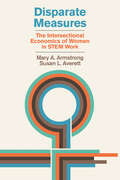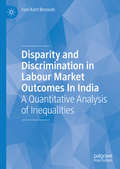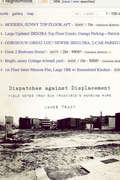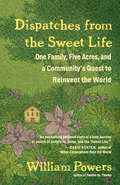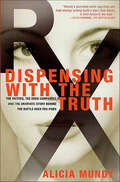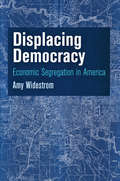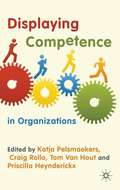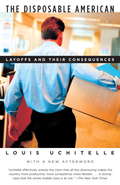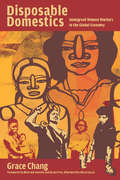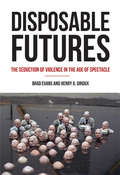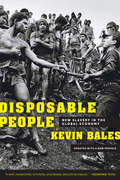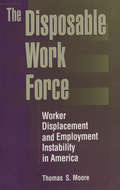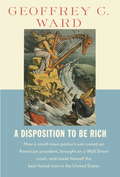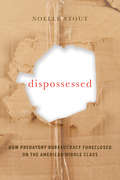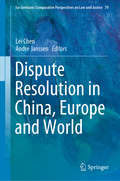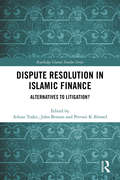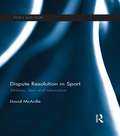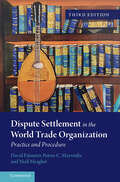- Table View
- List View
Disparate Measures: The Intersectional Economics of Women in STEM Work
by Mary A. Armstrong Susan L. AverettAn exploration of workplace participation and earnings patterns for diverse women in US STEM professions that upends the myth that STEM work benefits women economically.Seen as part economic driver, part social remedy, STEM work is commonly understood to benefit both the US economy and people—particularly women—from underrepresented groups. But what do diverse women find when they work in US STEM occupations? What do STEM jobs really deliver—and for whom? In Disparate Measures, Mary Armstrong and Susan Averett challenge the conventional wisdom that a diverse US STEM workforce will bring about economic abundance for the women who participate in it. Combining intersectionality theory and critical data theory with a feminist economic analysis, the authors explore how different groups of diverse women truly fare in US STEM professions.Disparate Measures is centered on eight unique, in-depth case studies, each of which provides an intersectional economic analysis (a term coined by the authors) of diverse women working in STEM occupations. Four case studies prioritize women of color and examine the STEM participation and earnings of Black women, American Indian and Alaska Native women, Asian and Pacific Islander women, and Hispanic women/Latinas; four additional case studies illuminate intersections that are frequently neglected by the STEM inclusivity literature: foreign-born women, women with disabilities, Queer women, and mothers. What the authors find in their groundbreaking, detailed analysis is that the promises of STEM are only partly true: when compared to women not working in STEM, most women are indeed economically elevated by STEM occupations—yet when compared to white men in the same STEM occupations, women&’s second-class status is usually reaffirmed. The authors conclude by offering seven &“big-picture&” recommendations for rethinking STEM equity, showing just how we can successfully confront the entrenched patterns of economic disadvantage faced by diverse women in STEM jobs.
Disparity and Discrimination in Labour Market Outcomes in India: A Quantitative Analysis of Inequalities
by Vani Kant Borooah“The author has done a service to this line of study by collating and analysing a novel dataset in a manner that is going to be of use for researchers of the labour market in India, a subject in need of critical enquiry.”– Shanti Chakravarty, Professor of Economics, Bangor University, Wales, UKThis book deconstructs the dynamics of the job market in an emerging economy (India) that has vast capital resources, addressing a key concern in relation to inequality in the labour market by social groups. The author examines the changing impact of caste on employment opportunity using two sets of large databases, and extends this analysis into religious affiliation and gender. The findings in this book will be of importance to those working in both research and policy, and makes an important contribution through addressing the decomposition of inequality based on disparity and discrimination.
Dispatches Against Displacement
by James TracySan Francisco is being eroded by waves of cash flowing north from Silicon Valley. Recent evictions of long-time San Francisco residents, outrageous rents and home prices, and blockaded "Google buses" are only the tip of the iceberg. James Tracy's book focuses on the long arc of displacement over almost two decades of "dot com" boom and bust, offering the necessary perspective to analyze the latest urban horrors.A housing activist in the Bay Area since before Google existed, Tracy puts the hardships of the working poor and middle class front and center. These essays explore the battle for urban space--public housing residents fighting austerity, militant housing takeovers, the vagaries of federal and state housing policy, as well as showdowns against gentrification in the Mission District. From these experiences, Dispatches Against Displacement draws out a vision of what alternative urbanism might look like if our cities were developed by and for the people who bring them to life.James Tracy is a Bay Area native and a well-respected community organizer. He is co-founder of the San Francisco Community Land Trust (which uses public and private money to buy up housing stock and take it out of the real estate market), as well as a poet and co-author of Hillbilly Nationalists, Urban Race Rebels, and Black Power.
Dispatches from the Sweet Life: One Family, Five Acres, and a Community's Quest to Reinvent the World
by William PowersMany fantasize about dramatically changing their lives — living in accordance with their ideals rather than the exigencies of job, bills, and possessions. William Powers actually does it. In his book Twelve by Twelve, Powers lived in an off-grid tiny house in rural North Carolina. In New Slow City, he and his wife, Melissa, inhabited a Manhattan micro-apartment in search of slow in the fastest city in the world. Here, the couple, with baby in tow, search for balance, community, and happiness in a small town in Bolivia. They build an adobe house, plant a prolific orchard and organic garden, and weave their life into a community of permaculturists, bio-builders, artists, and creative businesspeople. Can this Transition Town succeed in the face of encroaching North American capitalism, and can Powers and the other settlers find the balance they’re seeking? Dispatches from the Sweet Life is compelling, sobering, thought-provoking, and, no matter the outcome, inspiring.
Dispensing Beauty in New York & Beyond: The Triumphs and Tragedies of Harriet Hubbard Ayer
by Annette Blaugrund“An excellently researched mixture of history and biography about a maverick Victorian woman who made beauty her business.” —Barbara Goldsmith, New York Times-bestselling author Harriet Hubbard Ayer moved to New York City by 1883 and established Recamier Preparations, Inc., the earliest cosmetic company owned and operated by a woman. First with her creams and balms and then with her words about women’s health and beauty, she influenced several generations of women to look and feel good about themselves. The jealous and vindictive men in her life punished her for her ambition, accomplishments and independence by attempting to steal her lucrative business and seize her children. After she successfully sued them, they had her committed to an insane asylum. Indomitable, this former Chicago socialite reinvented herself as the highest paid newspaperwoman in the United States, editing the women’s pages of Joseph Pulitzer’s New York World. Her incredible story is presented here as never before.“Ayer emerges from Dr. Blaugrund’s portrait as an innovative entrepreneur, crack reporter, and pioneer of the American feminist movement.” —Sidney Offit, author, teacher, curator emeritus of the George Polk Journalism Award of the Author’s Guild “Just when we thought there were no more original American characters, along comes Annette Blaugrund’s fine biography of the little-known feminist pioneer Harriet Hubbard Ayer—her harrowing struggles, her inspiring achievements, her unexpected triumphs. What a marvelous tale written in a riveting manner!”—William A. Johnson, professor emeritus of philosophy, Brandeis University
Dispensing with the Truth: The Victims, the Drug Companies, and the Dramatic Story Behind the Battle over Fen-Phen
by Alicia MundySemi-finalist for the Robert F. Kennedy Memorial Book AwardIn 1996, a terrible epidemic began killing young American women. Some died quickly, literally dropping in their steps. Others took more time, from a few months to a few years. Those who weren't killed suffered damage to their lungs and hearts, much of it permanent and reparable only with major surgery. Doctors suspected what the killer was. So did the Food and Drug Administration. The culprits were the two most popular diet drugs in the United States, Pondimin, one-half of the popular drug combination Fen-Phen, and Redux, a stronger version of Pondimin. They were also two of the most profitable drugs on the market, and both were produced and sold by a powerful pharmaceutical company, Wyeth-Ayerst, a division of American Home Products. Dispensing the Truth is the gripping storry of what the drug really knew about its drugs, the ways it kept this information from the public, doctors, and FDA, and the massive legal battles that ensued as victims and their attorneys searched for the truth behind the debacle.It tells the story of a healthy young woman, Mary Linnen, who took the drugs for only twenty-three days to lose weight before her wedding, and then died in the arms of her fiance a few months later. Hers was the first wrongful-death suit filed amd would become the most important single suit the company would ever face.Alicia Mundy provides a shocking and thoroughly riveting narrative. It is a stark look at the consequences of greed and a cautionary tale for the future.
Displaced
by Olivia Bennett Christopher McdowellAlthough displacement is commonly associated with refugees fleeing conflict, millions of people are resettled every year in the name of development and progress. Many of these individuals endure social and cultural disruption as well as economic upheaval, and a significant number never regain their former quality of life. Despite this, the voices of those with direct experience of displacement are rarely heard. "Displaced "seeks to redress this, bringing together oral histories that reveal the loss of cultural continuity and identity, shifts in family responsibilities and gender roles, and fractured relationships between generations that are just some of the challenges people face as they attempt to rebuild lives and communities. Although these narratives are suffused with regret and a sense of loss, they also demonstrate resourcefulness and resilience in the face of profound change. Development's social cost continues to be under-reported; these stories are a crucial reminder of its often devastating consequences.
Displacement by Development
by Peter Penz Jay Drydykand Pablo S. BoseFor decades, policy-makers in government, development banks and foundations, NGOs, researchers and students have struggled with the problem of how to protect people who are displaced from their homes and livelihoods by development projects. This book addresses these concerns and explores how debates often become deadlocked between 'managerial' and 'movementist' perspectives. Using development ethics to determine the rights and responsibilities of various stakeholders, the authors find that displaced people must be empowered so as to share equitably in benefits rather than being victimized. They propose a governance model for development projects that would transform conflict over displacement into a more manageable collective bargaining process and would empower displaced people to achieve equitable results. Their book will be valuable for readers in a wide range of fields including ethics, development studies, politics and international relations as well as policy making, project management and community development.
Displacing Democracy
by Amy WidestromIn recent decades, economically disadvantaged Americans have become more residentially segregated from other communities: they are increasingly likely to live in high-poverty neighborhoods that are spatially isolated with few civic resources. Low-income citizens are also less likely to be politically engaged, a trend that is most glaring in terms of voter turnout. Examining neighborhoods in Atlanta, Kansas City, Milwaukee, and Rochester, Amy Widestrom challenges the assumption that the "class gap" in political participation is largely the result of individual choices and dispositions. Displacing Democracy demonstrates that neighborhoods segregated along economic lines create conditions that encourage high levels of political activity, including political and civic mobilization and voting, among wealthier citizens while discouraging and impeding the poor from similar forms of civic engagement.Drawing on quantitative research, case studies, and interviews, Widestrom shows that neighborhood-level resources and characteristics affect political engagement in distinct ways that are not sufficiently appreciated in the current understanding of American politics and political behavior. In addition to the roles played by individual traits and assets, increasing economic segregation in the United States denies low-income citizens the civic and social resources vital for political mobilization and participation. People living in poverty lack the time, money, and skills for active civic engagement, and this is compounded by the fact that residential segregation creates a barren civic environment incapable of supporting a vibrant civic community. Over time, this creates a balance of political power that is dramatically skewed not only toward individuals with greater incomes but toward entire neighborhoods with more economic resources.
Display Technologies, Inc. (Abridged)
by H. Kent Bowen Jonathan WestDisplay Technologies, Inc. (DTI) is a new joint venture between Toshiba and IBM Japan that is manufacturing the most advanced form of flat panel displays. With success in achieving significant production volumes, DTI has been asked to double its output as quickly as possible. Mr. Shima, DTI's president, must decide among three options, each of which has immediate and long-term strategic consequences.
Displaying Competence in Organizations
by Katja Pelsmaekers Craig Rollo Tom Van Hout Priscilla HeynderickxCompetence encompasses or overlaps with notions of efficiency, success, accountability, excellence and self-justification. This collection explores ways in which individuals, teams or groups in organizations discursively present themselves as competent to perform tasks or functions, possibly at a superior level.
The Disposable American
by Louis UchitelleUchitelle (The New York Times) traces the rise and fall of job security in the United States and its impact on the American economy and society. True to his journalistic background, he switches his lens back and forth between telescopic discussions of wide historical trends and economic and societal processes to focusing in on the individual experiences of individual workers and companies. Arguing that the current situation is harmful to individuals and the wider society, he ends his book with recommendations of legislation that can minimize and mitigate corporate layoffs. Annotation ©2006 Book News, Inc. , Portland, OR (booknews. com)
Disposable Diaper Industry in 1974
by Michael E. PorterDescribes the rapidly growing disposable diaper industry in 1974, a period in which Procter and Gamble's industry leadership faced strong challenges from Kimberly Clark, Johnson and Johnson, and Union Carbide. The latter two firms were in the process of entry into the industry. Focuses on the decision to enter the business, the barriers to entry, and the optimal reaction of going firms, in this case Procter and Gamble, to deter or impede entry. Software for this note is available (9-388-504).
Disposable Domestics: Immigrant Women Workers in the Global Economy
by Grace ChangThe book that &“has helped to make transnational analyses of reproductive labor central to our understanding of race and gender in the twenty-first century&” (Angela Y. Davis, author of Freedom Is a Constant Struggle). Illegal. Unamerican. Disposable. In a nation with an unprecedented history of immigration, the prevailing image of those who cross our borders in search of equal opportunity is that of a drain. Grace Chang&’s vital account of immigrant women—who work as nannies, domestic workers, janitors, nursing aides, and homecare workers—proves just the opposite: the women who perform our least desirable jobs are the most crucial to our economy and society. Disposable Domestics highlights the unrewarded work immigrant women perform as caregivers, cleaners, and servers and shows how these women are actively resisting the exploitation they face.&“As timely and relevant now as it was when it was first written . . . reveals a long history of collusion between the U.S. government, the IMF and World Bank, corporations, and private employers to create and maintain a super-exploited, low-wage, female labor force of caregivers and cleaners.&” —Robin D. G. Kelley, author of Hammer and Hoe&“Grace Chang&’s nuanced analysis of our immigration policy and the devastating consequences of global capitalism captures the experiences of poor immigrant women of color. Disposable Domestics reveals how these women, servicing the economy as domestics, nannies, maids, and janitors, are vilified by politicians and the media.&” —Mary Romero, author of The Maid&’s Daughter&“Refusing to segregate people, places, or processes, Disposable Domestics reorganizes our capacity to think powerfully about the world in which the struggle for social justice is too often imperiled by certain kinds of partiality.&” —Ruth Wilson Gilmore, author of Change Everything
Disposable Futures
by Brad Evans Henry A. GirouxDisposable Futures makes the case that we have not just become desensitized to violence, but rather, that we are being taught to desire it.From movies and other commercial entertainment to "extreme" weather and acts of terror, authors Brad Evans and Henry Giroux examine how a contemporary politics of spectacle--and disposability--curates what is seen and what is not, what is represented and what is ignored, and ultimately, whose lives matter and whose do not.Disposable Futures explores the connections between a range of contemporary phenomena: mass surveillance, the militarization of police, the impact of violence in film and video games, increasing disparities in wealth, and representations of ISIS and the ongoing terror wars. Throughout, Evans and Giroux champion the significance of public education, social movements and ideas that rebel against the status quo in order render violence intolerable."Disposable Futures poses, and answers, the pressing question of our times: How is it that in this post-Fascist, post-Cold War era of peace and prosperity we are saddled with more war, violence, inequality and poverty than ever? The neoliberal era, Evans and Giroux brilliantly reveal, is defined by violence, by drone strikes, 'smart' bombs, militarized police, Black lives taken, prison expansion, corporatized education, surveillance, the raw violence of racism, patriarchy, starvation and want. The authors show how the neoliberal regime normalizes violence, renders its victims disposable, commodifies the spectacle of relentless violence and sells it to us as entertainment, and tries to contain cultures of resistance. If you're not afraid of the truth in these dark times, then read this book. It is a beacon of light."--Robin D. G. Kelley, author of Freedom Dreams: The Black Radical Imagination"Disposable Futures confronts a key conundrum of our times: How is it that, given the capacity and abundance of resources to address the critical needs of all, so many are having their futures radically discounted while the privileged few dramatically increase their wealth and power? Brad Evans and Henry Giroux have written a trenchant analysis of the logic of late capitalism that has rendered it normal to dispose of any who do not service the powerful. A searing indictment of the socio-technics of destruction and the decisions of their deployability. Anyone concerned with trying to comprehend these driving dynamics of our time would be well served by taking up this compelling book."--David Theo Goldberg, author of The Threat of Race: Reflections on Racial NeoliberalismBrad Evans and Henry A. Giroux are internationally renowned educators, authors, and intellectuals. Together, they curate a forum for Truthout.com that explores the theme of "Disposable Futures." Evans is director of histories of violence project at the University of Bristol, United Kingdom. Giroux holds the global TV network chair professorship at McMaster University.educators, authors, and intellectuals. Together, they curate a forum for Truthout.com that explores the theme of "Disposable Futures." Evans is director of histories of violence project at the University of Bristol, United Kingdom. Giroux holds the global TV network chair professorship at McMaster University.
Disposable People
by Kevin BalesSlavery is illegal throughout the world, yet more than twenty-seven million people are still trapped in one of history's oldest social institutions. Kevin Bales's disturbing story of slavery today reaches from brick kilns in Pakistan and brothels in Thailand to the offices of multinational corporations. His investigation of conditions in Mauritania, Brazil, Thailand, Pakistan, and India reveals the tragic emergence of a "new slavery," one intricately linked to the global economy. The new slaves are not a long-term investment as was true with older forms of slavery, explains Bales. Instead, they are cheap, require little care, and are disposable. Three interrelated factors have helped create the new slavery. The enormous population explosion over the past three decades has flooded the world's labor markets with millions of impoverished, desperate people. The revolution of economic globalization and modernized agriculture has dispossessed poor farmers, making them and their families ready targets for enslavement. And rapid economic change in developing countries has bred corruption and violence, destroying social rules that might once have protected the most vulnerable individuals. Bales's vivid case studies present actual slaves, slaveholders, and public officials in well-drawn historical, geographical, and cultural contexts. He observes the complex economic relationships of modern slavery and is aware that liberation is a bitter victory for a child prostitute or a bondaged miner if the result is starvation. Bales offers suggestions for combating the new slavery and provides examples of very positive results from organizations such as Anti-Slavery International, the Pastoral Land Commission in Brazil, and the Human Rights Commission in Pakistan. He also calls for researchers to follow the flow of raw materials and products from slave to marketplace in order to effectively target campaigns of "naming and shaming" corporations linked to slavery. Disposable People is the first book to point the way to abolishing slavery in today's global economy. All of the author's royalties from this book go to fund anti-slavery projects around the world.
The Disposable Work Force: Worker Displacement and Employment Instability in America
by Thomas MooreThe twenty-first century has witnessed a transformation of the organization, opportunities, and terms of work. Downsizing, restructuring, and outsourcing are the forces altering employment relationships throughout the work force. Those who tend to see the future in a positive light view the evolving role between employer and employee as empowering for the individual.This book examines the consequences of economic instability due to job loss and the displacement of millions of workers. It draws upon case studies of worker displacement as well as national labor force surveys. Thomas S. Moore finds that consequences of economic instability are productivity slowdown, increased disparities in earnings and income, and higher average unemployment. He assesses the extent of job loss nationwide, its costs to the individuals directly affected, and the way in which the incidence of displacement and earnings loss has shifted over time. Although drawn from an earlier period, the data have an obvious relevance to today's labor markets.Moore argues for an employment and training system that gives employers an incentive to invest in the skills of their employees. Federally funded training programs have not improved the earning ability of displaced and disadvantaged workers, and state-sponsored programs tend to exclude those most in need of assistance. Moore suggests direct employer investment in the general skills of employees. Initially published in a different economic downturn, this continues to be a must read book for all economists, sociologists, and policymakers.
A Disposition to Be Rich
by Geoffrey C. WardFerdinand Ward was the greatest swindler of the Gilded Age. Through his unapologetic villainy, he bankrupted Ulysses S. Grant and ran roughshod over the entire world of finance. Now, his compelling, behind-the-scenes story is told--told by his great-grandson, award-winning historian Geoffrey C. Ward.Ward was the Bernie Madoff of his day, a supposed genius at making big money fast on Wall Street who turned out to have been running a giant pyramid scheme--one that ultimately collapsed in one of the greatest financial scandals in American history. The son of a Protestant missionary and small-town pastor with secrets of his own to keep, Ward came to New York at twenty-one and in less than a decade, armed with charm, energy, and a total lack of conscience, made himself the business partner of the former president of the United States and was widely hailed as the "Young Napoleon of Finance." In truth, he turned out to be a complete fraud, his entire life marked by dishonesty, cowardice, and contempt for anything but his own interests.Drawing from thousands of family documents never before examined, Geoffrey C. Ward traces his great-grandfather's rapid rise to riches and fame and his even more dizzying fall from grace. There are mistresses and mansions along the way; fast horses and crooked bankers and corrupt New York officials; courtroom confrontations and six years in Sing Sing; and Ferdinand's desperate scheme to kidnap his own son to get his hands on the estate his late wife had left the boy. Here is a great story about a classic American con artist, told with boundless charm and dry wit by one of our finest historians.
Dispossessed: How Predatory Bureaucracy Foreclosed on the American Middle Class (California Series in Public Anthropology #44)
by Noelle StoutIn the aftermath of the 2008 financial crisis, more than 14 million U.S. homeowners filed for foreclosure. Focusing on the hard-hit Sacramento Valley, Noelle Stout uncovers the predacious bureaucracy that organized the largest bank seizure of residential homes in U.S. history. Stout reveals the failure of Wall Street banks’ mortgage assistance programs—backed by over $300 billion of federal funds—to deliver on the promise of relief. Unlike the programs of the Great Depression, in which the government took on the toxic mortgage debt of Americans, corporate lenders and loan servicers ultimately denied over 70 percent of homeowner applications. In the voices of bank employees and homeowners, Stout unveils how call center representatives felt about denying appeals and shares the fears of families living on the brink of eviction. Stout discloses the impacts of rising inequality on homeowners—from whites who felt their middle-class life unraveling to communities of color who experienced a more precipitous and dire decline. Trapped in a Kafkaesque maze of mortgage assistance, borrowers began to view debt refusal as a moral response to lenders, as seemingly mundane bureaucratic dramas came to redefine the meaning of debt and dispossession.
Dispute Resolution in China, Europe and World (Ius Gentium: Comparative Perspectives on Law and Justice #79)
by Lei Chen André JanssenThis book brings together articles from leading experts in the field of international dispute resolution. The main focus is on the situation in Asia, though the European perspective also plays an important part. Accordingly, the focus on the Asian dispute resolution market with a distinctly American and European “touch” is one of the book’s most unique features. The dispute resolution market is rapidly transforming, and dispute resolution law is changing with it –especially in Asia. This book highlights recent advances and outlines future trends in this area. Emphasis is especially placed on International Commercial Arbitration Law on the one hand; and on International Investment Arbitration Law on the other. Two dedicated sections address these two topics, while another is dedicated to a quite new phenomenon in the field of international dispute resolution, the emergence of International Commercial Courts not only in Asia, but also in other regions of the world (e.g. in the Netherlands). This raises a host of interesting legal questions, which the book addresses. The book’s final section investigates general trends in dispute resolution (e.g. the rising cost problem in arbitration in general).
Dispute Resolution in Islamic Finance: Alternatives to Litigation? (Routledge Islamic Studies Series)
by Adnan Trakic John Benson Pervaiz K AhmedDispute Resolution in Islamic Finance addresses how best to handle disputes within Islamic finance. It examines how they can be resolved in a less confrontational manner and ensure such disagreements are settled in a just and fair way. There has been little focus on how disputes within Islamic finance are resolved. As a result, many of these disputes are resolved through litigation, notwithstanding that the various jurisdictions and court systems are generally poorly equipped to handle such matters. This book addresses this gap in our knowledge by focusing on five centres of Islamic finance: the United Kingdom, the United States of America, Malaysia, the Kingdom of Saudi Arabia and the United Arab Emirates. Before exploring these countries in detail, the book considers the issues of the choice of law within Islamic finance as well the prevailing forms of dispute resolution in this form of finance. The book brings together a group of leading scholars who are all specialists on the subject in the countries they examine. It is a key resource for students and researchers of Islamic finance, and aimed at lawyers, finance professionals, industry practitioners, consultancy firms, and academics.
Dispute Resolution in Sport: Athletes, Law and Arbitration (Ethics and Sport)
by David McArdleAn increasing number of sport disputes are being resolved by way of arbitration. This is the first book to critically examine the processes and benefits of sportspecific arbitration as compared to litigation. The book explores, in depth, the development of alternative dispute resolutions in sports, paying particular attention to high-profile institutions such as the Court of Arbitration for Sport, the FIFA Football Dispute Resolution Panel and important national-level bodies, and their relationship with national and international-level actors such as the IOC, WADA and the European Union. It also examines in detail the legal frameworks within which sports arbitration systems operate, considers their similarities with other arbitral bodies and considers the extent to which ADR in sport can be seen as a consequence of, and perhaps a solution to, the ‘juridification’ of sports. Offering a theoretical basis with which to understand the relationship between arbitration and litigation, as well as providing guidance on key contemporary issues and best practice, this book is important reading for students, researchers and practitioners working in sports law, sports management and administration, sports politics, sports ethics, and international organisation.
Dispute Settlement in the World Trade Organization: Practice and Procedure
by David Palmeter Petros C. Mavroidis Niall MeagherThe WTO dispute settlement process has evolved in recent years into one of the most successful, yet complex, systems of international arbitration. In this extensively revised new edition of Palmeter, Mavroidis, and Meagher's authoritative book on WTO dispute settlement, the authors provide a comprehensive overview of each step of the WTO dispute settlement process, examining both the history of the system, the governing legal rules, and the more informal procedural aspects of the process in detail. This edition takes into account the jurisprudence of panels and the Appellate Body up to the end of 2020 and includes an analysis of the current crisis in the WTO Appellate Body. This volume is an essential tool for practitioners, diplomats, government lawyers, and students of WTO law and should equally be of interest to students of other forms of international arbitration.
Dispute Settlement Reports 2015: Volume 1, Pages 1–576 (World Trade Organization Dispute Settlement Reports)
by World Trade OrganizationThe Dispute Settlement Reports of the World Trade Organization (WTO) include Panel and Appellate Body reports, as well as arbitration awards, in disputes concerning the rights and obligations of WTO members under the provisions of the Marrakesh Agreement Establishing the World Trade Organization. These are the WTO authorized and paginated reports in English. An essential addition to the library of all practicing and academic trade lawyers and needed by students worldwide taking courses in international economic or trade law. DSR 2015: Volume 1 reports on United States - Countervailing Duty Measures on Certain Products from China (WT/DS437).
Dispute Settlement Reports 2015: Volume 2, Pages 577–1268 (World Trade Organization Dispute Settlement Reports)
by World Trade OrganizationThe Dispute Settlement Reports of the World Trade Organization (WTO) include Panel and Appellate Body reports, as well as arbitration awards, in disputes concerning the rights and obligations of WTO members under the provisions of the Marrakesh Agreement Establishing the World Trade Organization. These are the WTO authorized and paginated reports in English. An essential addition to the library of all practicing and academic trade lawyers and needed by students worldwide taking courses in international economic or trade law. DSR 2015: Volume 2 reports on Argentina - Measures Affecting the Importation of Goods (WT/DS438, WT/DS444, WT/DS445).
